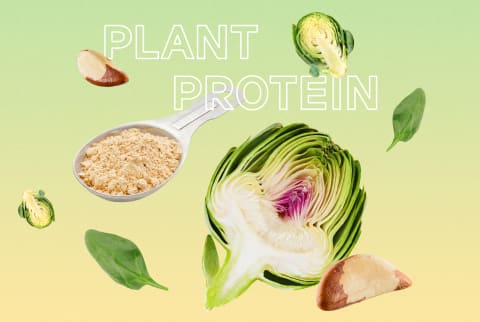Advertisement
The Best Vegan & Vegetarian Sources Of Protein


No one will deny that vegetables are good for your health. Plants are nutrient-dense powerhouses that contain various compounds that are essential for your body to function optimally, specifically for their ability to increase detoxification1 and help lower cancer risk2.
One of the biggest concerns I hear in my functional medicine practice is whether or not you can get an adequate amount of protein in your diets if you are relying mainly on plants. But contrary to what society has said, the reality is, we actually need less protein than we have been taught.
We are a society that has been bogged down with endless metabolic and other health problems due to our belief that we need glucose for fuel and the ever-increasing addition of sugar in our food supply—even in foods that you'd least expect. Even when you starve your body of glucose, if you are eating too much protein, your body will convert it to glucose as well. The key to managing blood sugar lies in moderating your protein intake. This is the whole idea of the popular ketogenic diet, which focuses on a high-fat, moderate-protein, and low-carb ratio of macronutrients.
Typically, I recommend anywhere between 0.5 to 1 gram of protein per pound of lean body weight, or the amount of weight on your body that isn't fat, each day. (Want to calculate yours? Here's an easy online tool.) Every person's ideal protein intake will vary based on your age, weight, sex, and activity level, but this is a good rule of thumb to start with, especially if you are making sure to get enough satiating healthy fats into your diet as well.
You may still be wondering how it is possible to even get this much protein into your diet, especially considering that animal sources contain a higher amount of protein per serving than vegetables, but if you remember that your meals are mostly, if not all, plants, these grams of protein will add up very quickly!
Regardless of whether you are vegan, vegetarian, or just looking to limit your meat intake, there are plenty of clean, protein-rich plant foods to choose from. And by focusing on a well-rounded variety of vegetables, nuts, and seeds, you will not only be getting adequate protein, you'll be ensuring you are getting a wide variety of essential nutrients as well.
Foods containing all nine essential amino acids are considered complete proteins and are found most abundantly in meat, dairy, eggs, and seafood. But that doesn't mean animal products are required. The truth is, we really can get all of the amino acids we need from plants alone. So here are some of my favorite lesser-known plant-based sources of complete protein.
- Hempeh (tempeh made from hemp seeds): 22 grams protein per 4 ounces hempeh
- Natto (organic non-GMO): 31 grams protein per 1 cup natto
- Tempeh (organic non-GMO): 31 grams protein per 1 cup tempeh
- Hemp protein powder: 12 grams protein per 4 tablespoons powder
- Hemp hearts/seeds: 40 grams protein per 1 cup hemp
- Nutritional yeast: 5 grams protein per 1 tablespoon yeast
- Sacha inchi seed protein powder: 24 grams protein per 4 tablespoons powder
- Spirulina: 4 grams protein per 1 tablespoon spirulina
These plant-based protein sources not only provide an excellent amount of protein per serving, but they are also easy to incorporate into your everyday meals as an addition to smoothies, on top of salads or other dishes, or alone as a snack. I especially love hemp protein, hemp hearts, sacha inchi powder, and spirulina in smoothies, and nutritional yeast makes a great popcorn topper.
You may remember that old concept of "protein combining" or pairing. The idea was that because complete proteins are not always found in plant sources, each meal had to include all essential amino acids in some combination. Now we know that this isn't necessary. We can get all our amino acids throughout the day, at various meals. When we chew, swallow, and digest our meals, our stomach doesn't divide our breakfast, lunch, and dinner. All the meals for the day are being digested, and the nutrients absorbed and utilized. Because of this, all we need to do is focus on getting all the essential amino acids on a regular basis—not necessarily at every meal. Even though most plant foods don't contain all nine essential amino acids, they are all represented in plant foods, so eating a wide variety of veggies along with some of the above complete protein sources can get you there. You'll also get many other vital nutrients your body needs to function optimally.
These are some of my favorite plant protein options with various amounts of essential amino acids. Focus on getting a variety of the seeds, nuts, vegetables, and fruits (listed below) to get all of those essential amino acids.
- Almonds: 12 grams protein per ½ cup almonds
- Walnuts: 10 grams protein per ½ cup walnuts
- Maca powder: 3 grams protein per 1 tablespoon maca
- Green peas: 9 grams protein per 1 cup cooked peas
- Almond butter: 6 grams protein per ¼ cup butter
- Spinach: 3 grams protein per ½ cup cooked spinach
- Avocado: 2 grams protein per ½ avocado
- Broccoli: 2 grams protein per ½ cup cooked broccoli
- Brussels sprouts: 2 grams protein per ½ cup sprouts
- Artichokes: 4 grams protein per ½ cup artichokes
- Asparagus: 2.9 grams protein per 1 cup asparagus
- Brazil nuts: 4 grams protein per 6 nuts
- Chia seeds: 2 grams protein per 1 tablespoon chia seeds
- Flaxseed: 2 grams protein per 1 tablespoon flaxseeds
These are just some examples of the variety of nuts, seeds, and vegetables you have to choose from. With so many ways to prepare these sources and combining them with other plant-based sources of healthy fats, you'll surely be getting the macronutrients your body needs to thrive—all while enjoying delicious meals.

Will Cole, IFMCP, DNM, D.C., is a leading functional medicine expert who consults people around the globe, starting one of the first functional medicine telehealth centers in the world. Named one of the top 50 functional and integrative doctors in the nation, Dr. Will Cole provides a functional medicine approach for thyroid issues, autoimmune conditions, hormonal imbalances, digestive disorders, and brain problems. He is the host of the popular The Art Of Being Well podcast and the New York Times bestselling author of Intuitive Fasting, Ketotarian,The Inflammation Spectrum, and Gut Feelings.
More from the author:
Functional Nutrition Training
Check out Functional Nutrition Coaching
A cutting-edge nutrition deep dive taught by 20+ top health & wellness experts
Learn moreMore from the author:
Functional Nutrition Training
Check out Functional Nutrition Coaching
A cutting-edge nutrition deep dive taught by 20+ top health & wellness experts
Learn more
Will Cole, IFMCP, DNM, D.C., is a leading functional medicine expert who consults people around the globe, starting one of the first functional medicine telehealth centers in the world. Named one of the top 50 functional and integrative doctors in the nation, Dr. Will Cole provides a functional medicine approach for thyroid issues, autoimmune conditions, hormonal imbalances, digestive disorders, and brain problems. He is the host of the popular The Art Of Being Well podcast and the New York Times bestselling author of Intuitive Fasting, Ketotarian,The Inflammation Spectrum, and Gut Feelings.